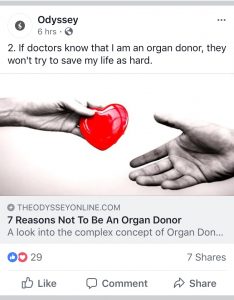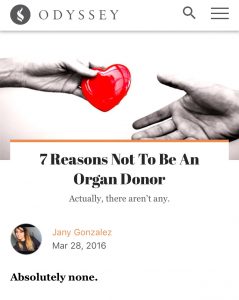I was scrolling through my News Feed on Facebook, and I came across this post by the Odyssey:
“7 Reasons Not to Be an Organ Donor”
I stopped scrolling. As a student in this class and as an organ donor myself, I was intrigued to discover the reasons for denouncing organ donation. So, I clicked. And this is what I saw:
“Actually, there aren’t any.”
I chastised myself for succumbing to click bait, but I marveled at the brilliance of the tactic.
This post attracts organ donors like myself because it challenges our beliefs. I wanted to know how someone could possibly come up with seven valid reasons for not becoming an organ donor. Yet, it also appeals to those who are not organ donors by validating their decision.
The article begins with statistics on the disparity between the number of people who support organ donation and the number of people who demonstrate their support by donating their organs. In the United States, the demand for organs is much greater than the supply. People die every day waiting on the organ transplant list.
In an attempt to amend these inequalities, the author dispels seven rumors that might persuade one to not become an organ donor.
Two rumors addressed in the article were previously discussed in class: “If doctors know that I am an organ donor, they won’t try to save my life as hard” and “Doctors might not be 100 percent sure that I am dead.” These rumors are not unfounded. Instances of supposedly brain dead patients that “wake up” during organ harvesting do exist, like this woman from New York. However, laws and practices are now in place to prevent these gross oversights from happening again.
Another common rumor, one that I even believed myself, is that organ donation precludes you from having an open casket funeral. If Americans harbor the misconception that organ donation will interfere with customary funeral practices, I can understand the decision to not become donors. The challenge, nonetheless, will be to educate people on the realities of organ donation.
I think this article is an excellent first step in informing the public about organ donation. In this age of technology, many people formulate their opinions from posts such as this one on Facebook. While the argument becomes too emotional at times, it is backed by evidence. To continue learning about other common rumors about organ donation, read the original article here.
References:


